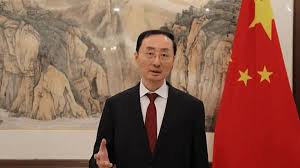
India Set to Host Chinese Vice Minister for High-Level Talks

 :
| Updated On: 11-Jun-2025 @ 12:29 pm
:
| Updated On: 11-Jun-2025 @ 12:29 pmSHARE
Chinese Vice Foreign Minister Sun Weidong is expected to visit India this week for a two-day high-level bilateral engagement, marking the second such interaction between the two nations this year. This visit follows Indian Foreign Secretary Vikram Misri’s trip to Beijing in January, during which both countries agreed on several steps aimed at normalizing relations that had been strained since the 2020 border standoff in eastern Ladakh. Sun and Misri had previously agreed to measures to improve ties, signaling a mutual intent to stabilize the relationship.
Sun’s upcoming visit further reinforces the recent positive trajectory in India-China relations, following the completion of the troop disengagement process in eastern Ladakh, which had been a major source of tension for nearly five years. The disengagement led to an improvement in the overall atmosphere, followed by a meeting between Indian Prime Minister Narendra Modi and Chinese President Xi Jinping in Russia in October. Two months after that, the Special Representatives (SR) Talks on the Boundary Question resumed, showing clear intent on both sides to restore diplomatic mechanisms.
According to reports, Sun will arrive in India on Thursday and is likely to meet with India’s National Security Advisor (NSA) Ajit Doval. He will also participate in talks under the foreign secretary–vice minister dialogue mechanism. These discussions are expected to cover progress made since the January meeting in Beijing, where both countries had agreed to resume the Kailash Mansarovar Yatra in the summer of 2025—a key demand from the Indian side that has now been accepted. The meeting is also likely to touch upon other issues such as cooperation on trans-border river water management and the long-pending resumption of direct air services between India and China, which were agreed upon "in principle" earlier this year.
Another likely agenda point is a potential visit by Prime Minister Modi to China in September for the Shanghai Cooperation Organisation (SCO) summit in Tianjin. Although Modi has been formally invited, he has yet to confirm his participation. The SCO summit will be preceded by a foreign ministers' meeting, which India’s External Affairs Minister S. Jaishankar is expected to attend. The visit by Sun—who was China’s ambassador to India during the initial stages of the Ladakh standoff—symbolizes a shared interest in advancing a fragile thaw in relations without letting external factors such as India-Pakistan tensions derail the momentum.
India, for its part, seeks a phased restoration of dialogue mechanisms that would allow both countries to address mutual concerns effectively. During the upcoming meetings, India is also expected to raise trade-related issues, pressing for a more transparent, stable, and predictable economic relationship with China. In their previous meeting, Misri and Sun had also committed to promoting greater people-to-people contact, including media and think tank interactions, as a way to build trust and enhance understanding.
In summary, Sun Weidong’s visit marks a key milestone in India-China diplomatic engagement post-Ladakh, with expectations for further cooperation on strategic, economic, and cultural fronts.
Contact Us
House. No. : 163, Second Floor Haridev Rd, near Puberun Path, Hatigaon,Guwahati, Assam 781038.
E-mail : assaminkcontact@gmail.com
Contact : +91 8811887662
Enquiry
×
Reporter Login
×